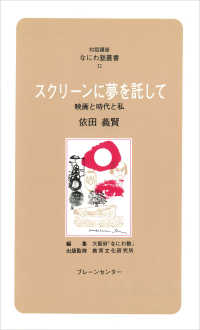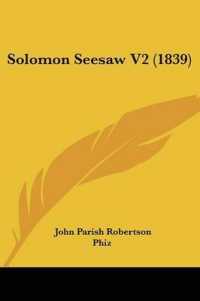- ホーム
- > 洋書
- > 英文書
- > History / World
Full Description
This book explores the impact of Alexander the Great's introduction of coined money on the economy and society of Egypt and its political implications for the formation of the Ptolemaic state. It argues that the introduction of coinage happened slowly, spreading gradually from Alexandria into the chora. Under Ptolemy II, however, Egypt was aggressively monetised. Using both numismatic and papyrological evidence, the workings of a rural monetary economy are reconstructed where coinage was in high demand, but in short supply. It is argued that by the middle of the third century BC Egypt was much more thoroughly monetised than is usually assumed, but that the degree of monetisation was sustained only by an extensive credit economy as well as ad hoc commutation of monetary payments into kind. Contextualising the complexities of credit and banking in rural Egypt, the book offers a fresh picture of their function in the ancient economy.
Contents
Introduction; 1. Questions and issues; 2. The historical background; Part I. Money and Coinage: 1. The money of the King; 2. Monetising the countryside; Part II. Cash and Kind: 3. Taxes; 4. Bronze and silver; 5. Rents; 6. Wages; Part III. Debt and Credit: 7. Formal loans (List 1-2); 8. Extending the credit economy (Lists 3-5); 9. Leases and labour contracts; 10. Credit in a social context; Part IV. Banking: 11. Banks and money supply; 12. Banking and business; Conclusion; Appendices.








